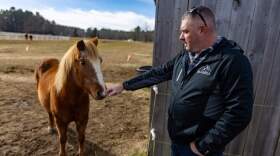-
Cuts to scientific research focused disproportionately on research around diversity equity and inclusion. Some researchers say we're just beginning to understand the impact.
-
A new study of more than 160,000 teens finds that even occasional cannabis use among 8th, 10th and 12th graders is tied to worse outcomes at school and more emotional distress.
-
The Trump administration wants to revamp U.S. childhood vaccination recommendations to align with some other peer nations, including one tiny country in northern Europe.
-
President Trump set the process in motion to ease federal restrictions on marijuana. But his order doesn't automatically revoke laws targeting marijuana, which remains illegal to transport over state lines.
-
If your New Year's resolution is to start resistance training, Life Kit is here to help. Sign up for our Guide to Building Strength and get a month of expert tips on how to create a lasting routine.
-
Figuring out the insurance options for families often falls to women. Some say they're delaying marriage, taking side jobs, and putting their kids on Medicaid as premium prices shoot up in 2026.
-
Household waste increases by 25% between Thanksgiving and New Years. Rules vary by municipality on what you can recycle and what needs to go into the trash.
-
Figuring out the insurance puzzle for families often falls to women. Some say they're delaying marriage, taking side jobs and putting their kids on Medicaid as premium prices shoot up in 2026.
-
Snow isn't always white; algae can make it look green, red, or orange, and scientists are trying to understand how and why these colorful patches appear.
-
Organoids are bits of neural tissue that model human brain development. Their use in science makes some uneasy, in part because the brain is so closely tied to our sense of self.
-
Emily Kwong and Berly McCoy of NPR's Short Wave talk about why swearing might improve physical performance, how birds' bills changed during the pandemic and why scientists are sampling whale breath.
-
New research suggests that prescription stimulants for ADHD don't actually improve attention directly. They work on different pathways in the brain that support attention. .








